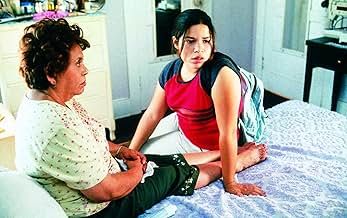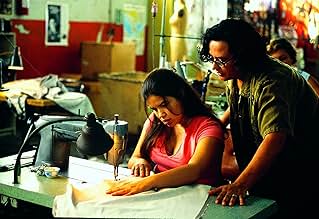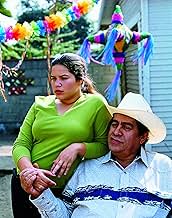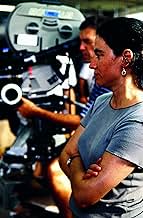NOTE IMDb
6,9/10
8,6 k
MA NOTE
Dans l'est de Los Angeles, une jeune fille de dix-huit ans se débat entre ses ambitions d'aller à l'université et de se marier, d'avoir des enfants et de superviser la petite usine textile f... Tout lireDans l'est de Los Angeles, une jeune fille de dix-huit ans se débat entre ses ambitions d'aller à l'université et de se marier, d'avoir des enfants et de superviser la petite usine textile familiale délabrée.Dans l'est de Los Angeles, une jeune fille de dix-huit ans se débat entre ses ambitions d'aller à l'université et de se marier, d'avoir des enfants et de superviser la petite usine textile familiale délabrée.
- Réalisation
- Scénario
- Casting principal
- Récompenses
- 8 victoires et 4 nominations au total
Lourdes Perez Nido
- Rosali
- (as Lourdes Perez)
Celina Belizan
- Glitz Receptionist
- (as Celina Belazin)
Jim Ishida
- Landlord
- (as Jimmy Ishida)
Agapito Leal
- Dr. Lopez
- (as Pete Leal)
Avis à la une
REAL WOMEN HAVE CURVES (2002) ***1/2 America Ferrera, Lupe Ontiveros, Ingrid Oliu, George Lopez, Brian Sites, Soledad St. Hilaire, Dale E. Turner. Above average indie diamond in the rough slice of life portrayal of a Mexican American teenager (Ferrara in a remarkable acting debut) trying to cope with her dream to attend college and her quarrelsome relationship with her loving but problematic mother (Ontiveros who gives a beautifully modulated turn) whose own insecurities and frustrations are taken out on her zaftig daughter. Funny, poignant and ultimately a triumph in full-bodied (no pun intended) protagonists without compromising it's clear headed vision of how society and culture myopically decides what is pleasant to the eye (or acceptable for that matter). Finally a film that portrays Latinos in a positive light by not making it a racial film' either. The screenplay by George LaVoo and Josefina Lopez (adapting her play) offers insight to familiar subject matter but with a refreshing focus on character development by not compromising it's strong message: to accept one self is to love one self. (Dir: Patricia Cardoso)
How could I be so blessed with 2 Mexican treasures within weeks of each other? After the heady romanticism and visual artistry of Julie Taymor's `Frida,' I was hardly prepared to see another arresting, Mexican melodrama, Patricia Cardoso's `Real Women Have Curves.' Every woman who thinks about her weight should see this movie-it will make you a convert to the humane notion that all bodies are beautiful. And it will reveal a deeply humane culture at the same time.
Naturally beautiful and full-bodied actress America Ferrera plays Ana, a Mexican American whose graduation and scholarship to Columbia University threaten the family's unity and the control by her mother, who tells stories of runaway girls with disastrous ends and the admonition, `That's what happens to girls who don't listen to their mothers.'
Like teenagers in any culture, Ana is trying to break away from a domineering culture and mother while she also achieves a balanced acceptance of her zaftig body. The scene where she and the other seamstresses in her sister's sweat shop remove their outer clothes to escape the heat and eventually admire their bulging, stretch-marked bodies is about as loving and lyrical as any other I have seen where Hollywood's obsession with world-class beauty is obliterated by the sheer attractiveness of women celebrating the imperfections of their bodies.
Equally so, when Ana loses her virginity, she tells her lover,
"Turn the lights on. I want you to see me. See, this is what I look like." He responds, "You're not fat. You're beautiful.' It's easy to see why this film won awards at Cannes for audience appreciation and ensemble acting. It is a hymn to a culture that values family and a girl who values herself.
Naturally beautiful and full-bodied actress America Ferrera plays Ana, a Mexican American whose graduation and scholarship to Columbia University threaten the family's unity and the control by her mother, who tells stories of runaway girls with disastrous ends and the admonition, `That's what happens to girls who don't listen to their mothers.'
Like teenagers in any culture, Ana is trying to break away from a domineering culture and mother while she also achieves a balanced acceptance of her zaftig body. The scene where she and the other seamstresses in her sister's sweat shop remove their outer clothes to escape the heat and eventually admire their bulging, stretch-marked bodies is about as loving and lyrical as any other I have seen where Hollywood's obsession with world-class beauty is obliterated by the sheer attractiveness of women celebrating the imperfections of their bodies.
Equally so, when Ana loses her virginity, she tells her lover,
"Turn the lights on. I want you to see me. See, this is what I look like." He responds, "You're not fat. You're beautiful.' It's easy to see why this film won awards at Cannes for audience appreciation and ensemble acting. It is a hymn to a culture that values family and a girl who values herself.
`Real Women Have Curves' feels a bit like a modern ethnic version of `Georgy Girl,' featuring a free-spirited young woman named Ana who doesn't quite fit the mold of what society believes a woman should look like.
Ana is a somewhat `overweight' high school senior living in East LA who has dreams of being the first person in her family to go to college. Her parents, however, have other plans for her life, which basically involve marriage, motherhood and a job working in her older sister's dress factory. Ana faces the struggle common to many young people who happen to be first-generation Americans: should she conform to the old-fashioned customs and traditions of her family or should she set out to make it on her own with all the advantages and opportunities available to people in this society? `Real Women Have Curves' avoids becoming a culture clash cliché through its keen observation of the minutiae of everyday life. Unlike most films, `Real Women' actually explores the day-to-day struggles of the working class in this country. The people in this film worry about whether or not they will be able to make a go of their businesses, whether or not their bills will get paid, whether or not a promising young student will be allowed to go to college and make something of herself or just end up as a cog in the system that absorbs so many of the underclass. It's these slice-of-life details that make the film interesting.
Ana's main foil is her own mother, who believes not only that her daughter is overweight and, thereby, ruining her chances to make an acceptable marriage, but that she must forego college in order to help with the family business. The majority of the conflict in the film occurs between these two women, both equally hardheaded, moody and determined to get what they want. America Ferrara as Ana, Lupe Ontiveras as her mother and Ingrid Oliu as Estela, her hardworking, levelheaded sister, create characters who are believable, subtle and instantly recognizable. Writers Josefina Lopez and George LaVoo have a sharp ear for the way people actually speak. Director Patricia Cardoso doesn't try to impress us with fancy camera angles or clever cutting. Instead, she lets the story develop naturally, allowing us to eavesdrop on a milieu that may seem strange to some of us. Cardoso knows full well that the universal nature of what she is showing us will draw us into the story and these characters' lives. It's nice, too, to see a film in which the young people are spending their time trying to get into good colleges instead of indulging in all the high school hijinks and hoopla we usually see in more mainstream movies these days.
True, the movie does sacrifice some of its verisimilitude by trying a bit too hard to be a `feel good' experience. One occasionally senses a certain straining for the upbeat moral message, as when Ana convinces her coworkers to strip down to their undies in the factory as a statement about how women should not be ashamed of their bodies just because they aren't a size six. But the film more than makes up for that in the unconventional way in which it treats Ana's departure from her mother at the end.
`Real Women Have Curves' is a small movie but a universal one.
Ana is a somewhat `overweight' high school senior living in East LA who has dreams of being the first person in her family to go to college. Her parents, however, have other plans for her life, which basically involve marriage, motherhood and a job working in her older sister's dress factory. Ana faces the struggle common to many young people who happen to be first-generation Americans: should she conform to the old-fashioned customs and traditions of her family or should she set out to make it on her own with all the advantages and opportunities available to people in this society? `Real Women Have Curves' avoids becoming a culture clash cliché through its keen observation of the minutiae of everyday life. Unlike most films, `Real Women' actually explores the day-to-day struggles of the working class in this country. The people in this film worry about whether or not they will be able to make a go of their businesses, whether or not their bills will get paid, whether or not a promising young student will be allowed to go to college and make something of herself or just end up as a cog in the system that absorbs so many of the underclass. It's these slice-of-life details that make the film interesting.
Ana's main foil is her own mother, who believes not only that her daughter is overweight and, thereby, ruining her chances to make an acceptable marriage, but that she must forego college in order to help with the family business. The majority of the conflict in the film occurs between these two women, both equally hardheaded, moody and determined to get what they want. America Ferrara as Ana, Lupe Ontiveras as her mother and Ingrid Oliu as Estela, her hardworking, levelheaded sister, create characters who are believable, subtle and instantly recognizable. Writers Josefina Lopez and George LaVoo have a sharp ear for the way people actually speak. Director Patricia Cardoso doesn't try to impress us with fancy camera angles or clever cutting. Instead, she lets the story develop naturally, allowing us to eavesdrop on a milieu that may seem strange to some of us. Cardoso knows full well that the universal nature of what she is showing us will draw us into the story and these characters' lives. It's nice, too, to see a film in which the young people are spending their time trying to get into good colleges instead of indulging in all the high school hijinks and hoopla we usually see in more mainstream movies these days.
True, the movie does sacrifice some of its verisimilitude by trying a bit too hard to be a `feel good' experience. One occasionally senses a certain straining for the upbeat moral message, as when Ana convinces her coworkers to strip down to their undies in the factory as a statement about how women should not be ashamed of their bodies just because they aren't a size six. But the film more than makes up for that in the unconventional way in which it treats Ana's departure from her mother at the end.
`Real Women Have Curves' is a small movie but a universal one.
I was showed this movie in my 11th grade class and I never thought that a movie like this would really be funny and dramatic. I really didn't think that this movie was going to be any good but I was wrong. I did what a lot of people do now a days, judged a book or movie by it's cover. But the message of this movie is to feel easy going about that very cover. Real Women Have Curve is a film that is about Mexican Americans and also the a view of how society standardize "sexy". Ana being a little overweight finds herself on an quest to find the sexy women in her and change the views of not only herself but the views of others as well.
I was very impressed with this movie. First of all, it's very funny. It's definitely a feel-good movie, but at the same time doesn't resort to campy sentimentality. It's also a film that escapes from the stereotypes and depicts Latinos like they're meant to be depicted. One realistic touch that I appreciated was that half the time the characters would speak Spanish and the other half they'd speak English. That is how it seems to be in most Latin-American families. You rarely hear English spoken 100 percent of the time, unless both the parents and children are from the states. The director didn't worry if American audiences would be too lazy to read the subtitles. What's the big deal about reading subtitles? I'm taking a class in International Film, so I always cringe at the fact that when I tell other students about the class, their immediate reactions are, "God, you gotta read subtitles?" I'm proud to be an American, but at times like that my pride gradually lessens.
It's about time a film is released in which the main character is not only female, but a slightly overweight female. Because, and those hypnotized by the media be prepared to gasp, not all women are a size 3! Who's to say that a woman can't be pretty while having a few extra pounds? I think America Ferrera is a very pretty girl, not to mention she has charm. In everyday society, there are overweight guys and girls who have dating lives! In this film, her eventual love interest is a skinny white guy. That's not unusual. Unfortunately, media possesses us into assuming that the only types of relationships involve pretty guys and pretty girls. I'm sure even in California that isn't always the truth, despite its reputation for being Land of the Beautiful People.
I like how the film depicts the girl's mom and her hypocritical attitudes towards her daughter's obesity. Throughout the film, I never understood why her much more overweight mother was criticizing her daughter for being a big fat pig. But this happens in real life! Later in the film, the mother even says, "I'm married. I have the right to be fat." Parents can have those attitudes, unfortunately. And like in the film, they don't hesitate to humiliate their sons and daughters in public for having a certain problem like obesity.
The acting is topnotch. Lupe Ontiveros doesn't always receive decent roles in American film, and it's because of that many American audiences aren't familiar with her. That's too bad, because she's really a terrific actress and in "Real Women" I finally did get a chance to see her in a decent role. The ironic thing is she's often cast as Hispanic characters (usually maids) who have just came to this country, yet she was born in the states and hardly has an accent. Newcomer Ferrera is also incredible, and I hope to see her in future projects. She really has much potential, and if Hollywood studios decide to remove their heads from their behinds and cast men and women who aren't less than 120 pounds (in roles other than the "fat slob") she'll become a rising star. Finally, I was genuinely impressed with George Lopez, who actually plays a serious role, never once drifting into comic territory. It's rare to find a comedian who has just as much talent at acting as being funny, so it's nice to discover that George may be one of those people.
If you want to see a good, solid, entertaining low-budget indie gem that'll make you think and make you laugh, then this is definitely the film for you! It's one of the most original films I've seen come out in a while.
My score: 8 (out of 10)
It's about time a film is released in which the main character is not only female, but a slightly overweight female. Because, and those hypnotized by the media be prepared to gasp, not all women are a size 3! Who's to say that a woman can't be pretty while having a few extra pounds? I think America Ferrera is a very pretty girl, not to mention she has charm. In everyday society, there are overweight guys and girls who have dating lives! In this film, her eventual love interest is a skinny white guy. That's not unusual. Unfortunately, media possesses us into assuming that the only types of relationships involve pretty guys and pretty girls. I'm sure even in California that isn't always the truth, despite its reputation for being Land of the Beautiful People.
I like how the film depicts the girl's mom and her hypocritical attitudes towards her daughter's obesity. Throughout the film, I never understood why her much more overweight mother was criticizing her daughter for being a big fat pig. But this happens in real life! Later in the film, the mother even says, "I'm married. I have the right to be fat." Parents can have those attitudes, unfortunately. And like in the film, they don't hesitate to humiliate their sons and daughters in public for having a certain problem like obesity.
The acting is topnotch. Lupe Ontiveros doesn't always receive decent roles in American film, and it's because of that many American audiences aren't familiar with her. That's too bad, because she's really a terrific actress and in "Real Women" I finally did get a chance to see her in a decent role. The ironic thing is she's often cast as Hispanic characters (usually maids) who have just came to this country, yet she was born in the states and hardly has an accent. Newcomer Ferrera is also incredible, and I hope to see her in future projects. She really has much potential, and if Hollywood studios decide to remove their heads from their behinds and cast men and women who aren't less than 120 pounds (in roles other than the "fat slob") she'll become a rising star. Finally, I was genuinely impressed with George Lopez, who actually plays a serious role, never once drifting into comic territory. It's rare to find a comedian who has just as much talent at acting as being funny, so it's nice to discover that George may be one of those people.
If you want to see a good, solid, entertaining low-budget indie gem that'll make you think and make you laugh, then this is definitely the film for you! It's one of the most original films I've seen come out in a while.
My score: 8 (out of 10)
Le saviez-vous
- AnecdotesThe producers put out a casting call for girls who were "fat" or "overweight", and had thousands of girls show up who were clearly not fat or overweight, but all thought that they were.
- GaffesAna's boyfriend, about to graduate from high school, says he will now go to "Teachers College." Teachers College is a graduate school only; it has no undergraduate program.
- ConnexionsFeatured in HBO First Look: Real Women Have Curves (2002)
- Bandes originalesChica Dificil
Written by Héctor Buitrago and Andrea Echeverri
Performed by Aterciopelados
Courtesy of BMG Latin
Meilleurs choix
Connectez-vous pour évaluer et suivre la liste de favoris afin de recevoir des recommandations personnalisées
- How long is Real Women Have Curves?Alimenté par Alexa
Détails
- Date de sortie
- Pays d’origine
- Langues
- Aussi connu sous le nom de
- Las mujeres verdaderas tienen curvas
- Lieux de tournage
- Boyle Heights, Los Angeles, Californie, États-Unis(Ana Garcia's house)
- Sociétés de production
- Voir plus de crédits d'entreprise sur IMDbPro
Box-office
- Budget
- 3 000 000 $US (estimé)
- Montant brut aux États-Unis et au Canada
- 5 853 194 $US
- Week-end de sortie aux États-Unis et au Canada
- 183 772 $US
- 20 oct. 2002
- Montant brut mondial
- 7 777 790 $US
- Durée
- 1h 30min(90 min)
- Couleur
- Mixage
- Rapport de forme
- 1.85 : 1
Contribuer à cette page
Suggérer une modification ou ajouter du contenu manquant































